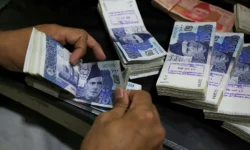INTERNATIONAL INSTITUTIONS PROJECT POSITIVE GROWTH FOR PAKISTAN’S ECONOMY

Hira Tahir
Pakistan’s economic growth is receiving a boost as international institutions
project increased confidence in the country’s government policies and
reforms.According to reliable institutions such as the World Bank, Asian
Development Bank (ADB), and International Monetary Fund (IMF), Pakistan’s
economy is expected to experience varying levels of growth. Projections
indicate growth rates of 1.7 percent, 1.9 percent, and 3.5 percent, as per the
respective institutions. The Monetary Policy Committee (MPC), in its first meeting
for the fiscal year 2024, provided its own projections, stating that the expected
range for real GDP growth in FY-24 is between 2.0 and 3.0 percent.The federal
government recently released the GDP growth figures for the first quarter, revealing a
growth rate of 2.1 percent during the July-September period.
Asian Development Bank (ADB) In its December 2023 ‘Asian Development
Outlook, report stated that, there is an expectation of a slowdown in Pakistan’s
inflation rate in the coming months. The ADB report states that although the
inflation rate averaged 28.5% from July to October, it is anticipated to ease due
to fiscal consolidation, monetary tightening, and improved availability of food
and key imported inputs.In addition, Fitch Ratings, an American credit rating
agency, has assigned Pakistan’s Long-Term Foreign-Currency Issuer Default
Rating (IDR) at ‘CCC’. The positive rating for the currency was influenced by
Pakistan’s IMF staff-level agreement (SLA) in November, which was subsequently
approved by the IMF Executive Board in July 2023. The performance of the caretaker
government also played a significant role in improving the currency rating.
The Managing Director of the International Monetary Fund (IMF),
Kristalina Georgieva, has also praised the Pakistani government for its efforts
in maintaining economic stability and implementing reforms in a timely manner.
This acknowledgment from the IMF comes after a thorough review of Pakistan’s
economic progress, resulting in a staff-level agreement and granting access to
approximately $700 million in funding.The IMF’s endorsement not only strengthens
Pakistan’s credibility but also instills a “sense of security” among other lenders,
indicating that the nation is capable of repaying its loans. Pakistani rupee has
rebounded from its record low in early September, inflation rates remain elevated.
Despite this challenge, the IMF’s support and the government’s commitment to
implementing reforms are expected to contribute to Pakistan’s economic stability and
growth.
The International Monetary Fund (IMF) in its highly anticipated World Economic
Outlook report on October 10, 2023 also projects a positive GDP growth rate of
2.5% for Pakistan in 2024, a significant improvement compared to the negative 0.5%
experienced in 2023. Additionally, inflation rates are expected to decrease, with a
projected rate of 23.6% for 2024, compared to 29.2% in 2023.The IMF also
forecasts a decrease in unemployment rates for Pakistan, with a projected rate
of 8% in 2024, compared to 8.5% in 2023. In terms of government finances, Pakistan’s
general government net lending/borrowing is expected to improve, with a projection of
negative 7.6% for 2024, as opposed to negative 8.1% in 2023.However, it is worth
noting that the IMF has also projected a potential rise in Pakistan’s GDP growth
rate to 5% by FY028.
World Bank also released a report titled “South Asia Development Update:
Toward Faster, Cleaner Growth,” which projects a positive growth return for
Pakistan in the fiscal year 2023-24, albeit at a rate of 1.7 percent.One positive
development mentioned in the report is the decrease in consumer price inflation in
Pakistan. In August, it decreased to 27 percent from a peak of 38 percent in May. The
report also notes that although the Pakistani rupee experienced significant
depreciation between early 2022 and early 2023, it has since remained relatively
stable. Furthermore, the primary fiscal deficits in Pakistan is expected to decrease
over the projection period, indicating progress in fiscal management.In terms of
imports, the report states that the US dollar value of goods imports in Pakistan
decreased by 26 percent in the year up to August 2023. This decline can be attributed
to import and capital controls implemented during this period.
The positive growth projections made by international institutions have
significant implications for Pakistan’s economy. Firstly, they instill confidence in both
domestic and foreign investors, encouraging them to invest in various sectors of the
economy. This influx of investment can create job opportunities, boost industrial
output, and contribute to overall economic expansion. Furthermore, positive growth
projections enhance Pakistan’s credibility and reputation on the global stage. This can
lead to increased foreign direct investment, improved access to international capital
markets, and greater cooperation with international institutions. These developments
can be directly attributed to the government’s diligent efforts in implementing effective
policies and reforms. The recognition and support received from international financial
institutions further underscore the nation’s commendable progress in economic
management and reform implementation. Such positive recognition serves as a
testament to Pakistan’s commitment to fostering a conducive environment for
sustainable economic growth.





